Дно
One of the words I love in Russian is дно, which means bottom in the sense of the bottom of a glass or the bottom of the ocean or the bottom of a barrell. I love it because words just don't start with 'dn' in English, so it's a complete shock when students first encounter it. We English speakers want to put a vowel between the д and the н, but the Russians don't do that at all. Insteaad they start making the д sound, and the air that builds up in the mouth behind the tongue is released through the nose. The singular of the word is perfectly regular, but it has an irregular plural:
| Sg | Pl | |
| Nom | дно | донья |
| Acc | ||
| Gen | дна | доньев |
| Pre | дне | доньях |
| Dat | дну | доньям |
| Ins | дном | доньями |
The place American students of Russian are most likely to first encounter this word is when they go to Russia for their first study-abroad program. The first week of class they diligently do their homework every day, and then Friday night rolls around and their new Russian friends invite them home for dinner and vodka, and once the vodka starts flowing they learn the phrase «до дна» "to the bottom," which essentially means their buddies don't want them to sip the vodka like a sensible human being, but to do the shot all at once and then follow it with beer, wine, or more vodka. Thus «до дна» is about the equivalent of the phrase "bottoms up" in English. (And of course in the morning the students wake up with похмелье and swear they will never drink again, which of course doesn't work because they are in Russia. To really refuse alcohol in Russia you need a nice solid religious mooring, so I recommend that all my readers immediately become Baptists.)
But of course the word has a thousand other uses that have nothing to do with alcohol:
| Президент Монголии опустился на дно Байкала. (source) | The President of Mongolia has traveled to the bottom of Lake Baikal. |
| На дне Мексиканского залива найдено "ужасающее" количество нефти. (source) | A horrifying amount of oil has been found on the bottom of the Gulf of Mexico. |
| Со дна Балтийского моря подняли самое старое в мире шампанское. (source) | The world's oldest champaigne has been raised from the bottom of the Baltic Sea. |
| Европейский авторынок идет ко дну. (source) | The European auto market is tanking. [lit. "going to the bottom"] |
Разбираться/разобраться
One of the verbs I really like in Russian is разбираться. It has several meanings, but the one I have in mind today is the equvialent of "to have insight into, to understand". In this sense the verb is only used in the imperfective. For instance,
| На рынке: — Девушка, я плохо разбираюсь в пельменях. Не объясните, какая разница? — Это пельмени с мясом, а это не пельмени, а вареники с вишней, а это грузинские хинкали с мясом и бульоном. |
At the market: "Miss, I don't understand all the types of pelmeni. Could you explain the differences?" "These are meat-filled pelmeni, whereas these aren't pelmeni, but rather vareniki with cherry filling, and these are Georgian khinkali that have meat and broth in them." |
| — Я не знаю, как решить это уравнение. Не поможешь? — Саша наверно поможет. Он хорошо разбирается в математике, а я нет. |
"I don't know how to solve this equation. Could you help me?" "Aleksandr will probably help you. He understands math pretty well. I don't." |
| Люди с синдромом Аспергера плохо разбираются в людях и плохо понимают их мимику. | People with Asperger's syndrome have difficulty understanding people and have trouble recognizing facial expressions. |
As an imperfective/perfective pair the verb can mean "to sort out the details, to figure out what's going on, to clarify the situation":
| Хаус удивительный врач. Он хорошо разбирается в самых сложных заболеваниях. | House is an amazing doctor. He is quick to figure out the most incomprehensible cases. |
| Мы посылаем специалистов в Мексиканский залив. Как только они разберутся в ситуации там, они сообщат нам, какие меры надо применить. | We are sending specialists to the Gulf of Mexico. As soon as they figure out the situation there, they will let us know what steps have to be taken. |
Here is the conjugation of the verb for your convenience:
| Imperfective | Perfective | |
| Infinitive | разбираться | разобраться |
| Past | разбирался разбиралась разбиралось разбирались |
разобрался разобралась разобралось разобрались |
| Present | разбираюсь разбираешься разбирается разбираемся разбираетесь разбираются |
No such thing as perfective present in Russian. |
| Future |
буду разбираться будешь разбираться будет разбираться будем разбираться будете разбираться будут разбираться |
разберусь разберёшься разберётся разберёмся разберётесь разберуться |
| Imperative | разбирайся разбирайтесь |
разберись разберитесь |
Notes: "House" is amazingly popular in Russia. Everyone I talk to here has watched it.
The conversation about пельмени is based on one I had at the Чеховский рынок in Казань. The woman who ran the pelmeni stand was particular gracious and willing to have an extended conversation with a foreigner. It was she who introduced me to хинкали. She was selling mass-produced ones that were very good. I think regular khinkali actually have thinner dough. See this Wikipedia article for a picture.
Фрикадельки
Sometimes a word just sounds so funny that you laugh out loud the first time you hear it, and one of those words for me was фрикаделька, which means meatball. Why is it funny? I suppose it reminds me of words like roley-poley or higgledy-piggledy. In fact when I first heard it, I was sure it must have come from some kind of child's poem. I was wrong. Fasmer says that it was borrowed from German Frikadelle or French fricadelle, which originally came from Italian frittadella, meaning "fried in a pan." Despite the fact that the word in Italian meant 'fried,' фрикадельки in Russia aren't fried in a pan, but rather boiled in some kind of broth. Here's how it declines:
| Sg | Pl | |
| Nom | фрикаделька | фрикадельки |
| Acc | фрикадельку | |
| Gen | фрикадельки | фрикаделек |
| Pre | фрикадельке | фрикадельках |
| Dat | фрикаделькам | |
| Ins | фрикаделькой | фрикадельками |
Although you usually encounter the word in the plural, it is also possible to find it in the singular. There is also a non-diminutive form фрикадель, although I haven't heard it in common speech.
Фрикадельки can be made of the flesh of pretty well any animal. When you are specifying what kind of meatballs they are, usually you use the preposition из followed by the genitive case of the type of meat. The four types I have encountered most often this summer are listed below. (I'll explain why I added Google hits in a moment.)
| Google hits | ||
| chicken | фрикадельки из курицы | 59,200 |
| beef | фрикадельки из говядины | 37,600 |
| fish | фрикадельки из рыбы | 38,400 |
| pork | фрикадельки из свинины | 21,100 |
Sometimes you also hear the word фрикадельки preceded by an adjective to indicate the type of meat. I was curious which construction was more common, so I ran a Google hit comparison (2010-07-18) to determine that. Making grammatical judgments by a Google hit count is not a reliable way to understand the intricacies of grammar, but for what it's worth, it looks like the «из» construction is more common than the adjectival construction:
| Google hits | ||
| chicken | куриные фрикадельки | 11,500 |
| beef | говяжьи фрикадельки | 1,440 |
| fish | рыбные фрикадельки | 20,800 |
| pork | свиные фрикадельки | 2,070 |
My favorite фрикадельки at the moment are the курино-говяжьи фрикадельки 'chicken and beef meatballs' served at the Трали-Вали dining room at ТГГПУ. Oddly enough, I don't get any hits on that phrase at all on Google, so perhaps they are a newer type of фрикадельки.
Here are some sample sentences with the word фрикадельки:
| Я вчера сделала двести фрикаделек из говяжьего фарша. | Yesterday I made two hundred ground beef meatballs. |
| — Какой у нас суп сегодня? — Рассольник с фрикадельками. — Правда? Дайте две порции. Я рассольник обожаю. |
"What soup do we have today?" "Pickle soup with meatballs." "Really? Two servings, please. I adore pickle soup." |
| На гарнир к фрикаделькам можно подать картофель, рассыпчатый рис, кашу, макаронные изделия, отварные овощи, салат из сырых овощей. (adapted from this source) | As a side dish for meatballs you can serve potatoes, rice, boiled grain dishes, pasta, boiled vegetables, or a raw vegetable salad. |
| Мексиканские повары приготовили самую большую фрикадельку в мире весом почти 50 килограммов. (adapted from this source) | Mexican chefs have made the world's largest meatball, weighing nearly 50 kilos. |
Пакет
The Russian word for a plastic bag, like the kind you get in a grocery store to hold your groceries, is пакет. It's a completely regular noun. In many American grocery stores the cost of the bag is included in the price of the food, and the cashier and bagger will automatically bag the food for you. Not so in Russia. Usually the cashier will ask you something like:
| Пакет нужен? | Do you need a bag? |
To which you may respond
| Да, пожалуйста. | Yes, please. |
or
| Нет, не нужен. | No, I don't. |
and then you bag the groceries yourself. Since they actually have to pay for a plastic bag every time they get one, the Russians are much more careful with them than Americans are. If you are about to go to the grocery store, you pack a few plastic bags in your purse or pocket. I've been in Kazan over a month now, and I can tell you that anytime I go out of the house, I make sure I have at least one plastic bag neatly folded in my briefcase or back pocket just in case I have to buy something on the way.
Here are some sample sentences:
| — Что у тебя в пакете? — Водка, пиво и копчёная рыба. |
"What do you have in the bag?" "Vodka, beer, and smoked fish." |
| Я всегда ношу с собой два-три пакета на случай, если надо будет что-то купить. | I always carry two or three plastic bags with me just in case I have to buy something. |
| Из пакета мама вынула торт «Птичье молоко». | Mama took a Bird's Milk Cake out of the bag. |
| Потеряв палец или стопу, упакуй её в двойной пакет. (adapted from here) | If you lose a toe or a foot, pack it in a double plastic bag. |
Киоск
One word that gets used a lot more in Russian than in English is киоск kiosk. I think the average American doesn't normally use this word, and I think most of us don't even have a clear idea of what it means. My first encounter with the word in English was at the University of Arizona. There were several brick structures which we called kiosks that had bulletin boards attached to which one could staple announcements for concerts, parties, businesses, etc. That is not what киоск means in Russian. A киоск is a small stand or booth where people sell things. Usually it's a free-standing structure, though it can also be part of a larger one. (It's never just a cart.) These are everywhere in Russia: at train stations, in the subway, anywhere there is a pedestrian street. And they sell all kinds of stuff. To say what kind of stand it is, Russians sometimes put an adjective before the noun:
| газетный киоск | news stand |
| сувенирный киоск | souvenir stand |
| цветочный киоск | flower stand |
| книжный киоск | book stand |
| пивной киоск | beer stand |
Sometimes the description of the stand comes in the genitive case after the noun:
| киоск ремонта обуви | shoe repair stand |
During the Soviet period you could find the oddest things at kiosks. The ones that seemed to have the most variety were the газетные киоски. I remember seeing toothbrushes and red pepper being sold в газетных киосках.
The noun itself is fairly straightforward with no grammatical quirks (as long as you remember the seven-letter spelling rule). Here are some sample sentences:
| Я никогда не хотела работать в сувенирном киоске, но я здесь работаю уже пятый год. | I never wanted to work at a souvenir stand, but I've been working here for going on five years now. |
| Рядом с цветочным киоском находится банкомат. | There is an ATM next to the flower shop. |
| Когда я подошёл к газетному киоску, Комсомольксой правды уже не было. | When I walked up to the news stand, they were already out of Komsomol'skaya Pravda. |
| Если хочешь открыть пивной киоск около станции метро, то надо платить крыше, а то киоск подожгут. | If you want to open a beer stand near the subway station, then you have to pay protection money, otherwise they'll set the stand on fire. |
Here are some shots of various kiosks around Kazan. This first one is basically a beer, snacks, and tobacco place. Its sign reads:
| BEER JUICE SOFT DRINKS |
24 hours |
PHOTOCOPIES DOCUMENT PRINTING HOOKAH SUPPLIES |
There is a reason that they offer printing services here. Right nearby there is an Architectural University. Universities here don't offer printing services to their students. They often don't have the internet. And students are too poor generally to own printers.
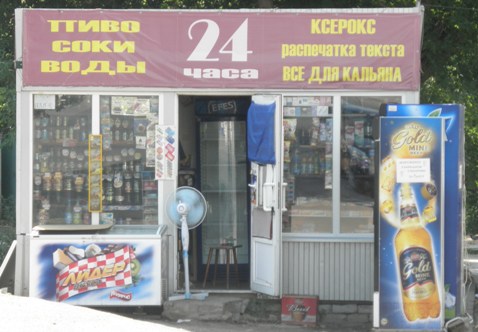
This next one is a flower stand.
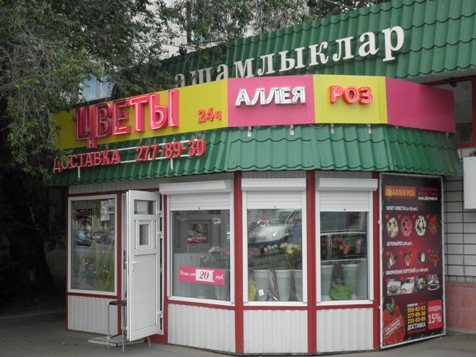
And here we have a souvenir stand:
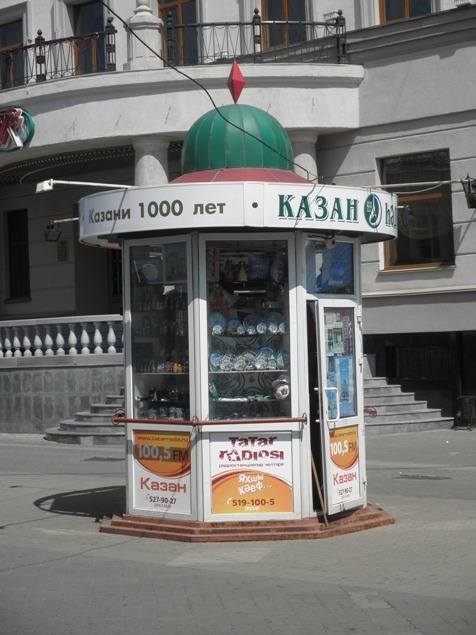
This next one is a shoe repair stand.
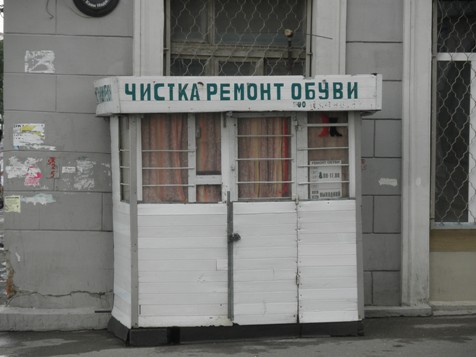
And here is a beer stand. The beer stand is interesting because you have to pay for both the beer and the container. If you bring your own plastic bottle in, then you just pay for the beer and they fill your bottle for you.
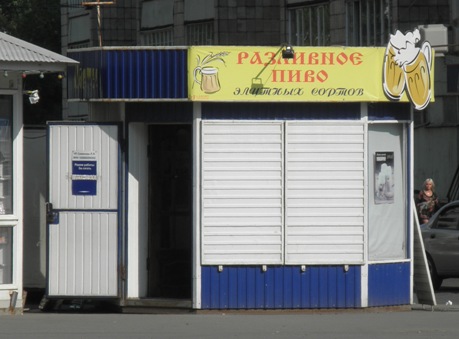
Last but not least, here is a little auto supply kiosk. They mostly sell oil and antifreeze.
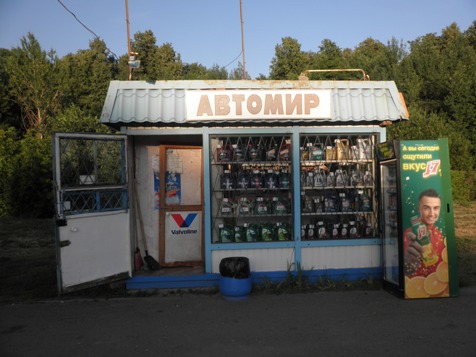
<< 1 ... 54 55 56 ...57 ...58 59 60 ...61 ...62 63 64 ... 158 >>